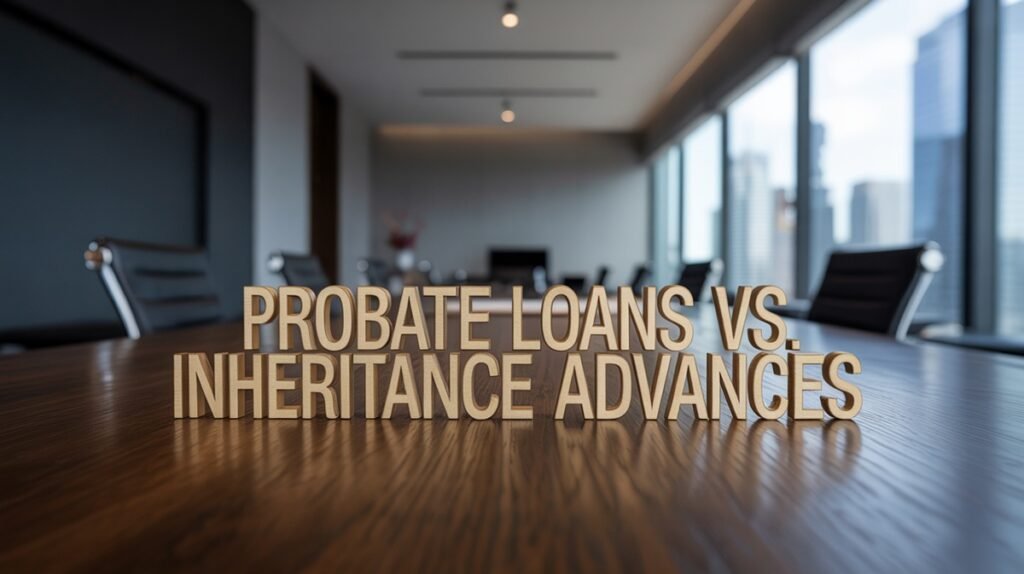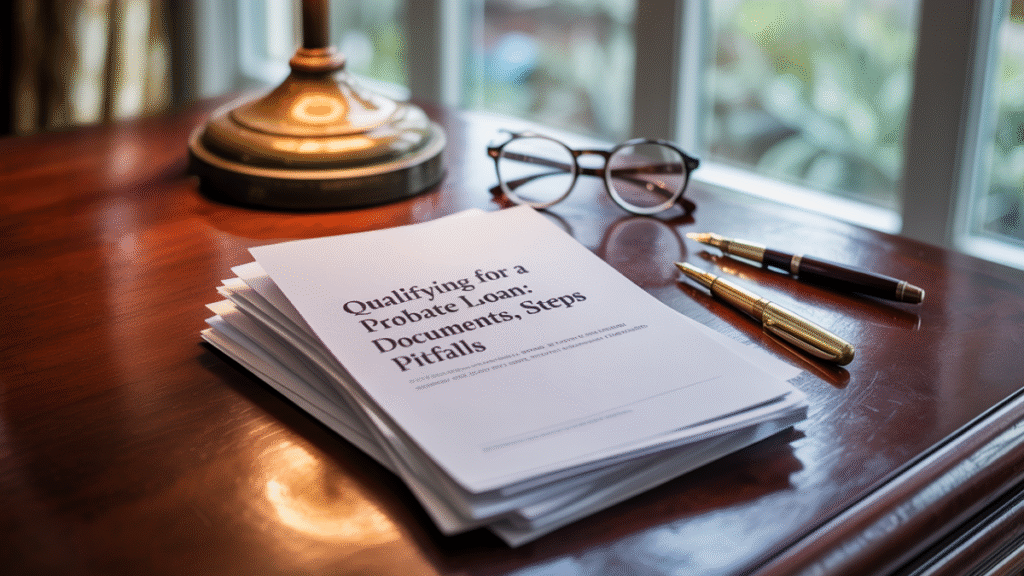| Feature | Inheritance Advance | Probate Loan | Personal Loan |
| Repayment | From estate | From estate | Monthly by borrower |
| Credit Check | No | Sometimes | Yes |
| Speed | 3–7 days | 1–2 weeks | Varies |
| Cost | High | Moderate | Depends on credit |
| Risk | None | Possible guarantee | Full borrower risk |
💰 Probate Isn’t Free
Court costs, appraisals, attorney fees — they add up fast.
Estimate your total out-of-pocket costs before you get surprised.
→ Calculate Your Probate Fees
What Exactly Is an Inheritance Advance?
- Definition: An inheritance advance lets you get part of your inheritance money before the estate finishes probate. A company gives you a portion of what you’re set to inherit, then collects the full share directly from the estate when probate wraps up.
- Not a loan: You’re not paying interest, there are no monthly payments, and your credit isn’t involved. The company is technically purchasing a portion of your future inheritance, not lending you money.
Why Some People Choose Inheritance Advances
- Immediate financial needs: Some heirs are facing urgent financial emergencies, such as medical bills, overdue rent, or critical home repairs. Waiting through the months-long probate process isn’t an option.
- Convenience over waiting: Others may want access to funds now to handle business ventures or life transitions that can’t wait.
- Lack of other options: Individuals with limited credit or income may not qualify for loans, making an inheritance advance one of the few cash solutions available.
How the Whole Process Works
- Apply with an inheritance funding company and submit documents showing your connection to the estate and your expected share.
- The company verifies the estate’s value, your inheritance portion, and whether probate has officially begun.
- They estimate your expected payout and make an advance offer, usually only for a portion of your total inheritance.
- Once you accept, you sign a contract laying out the amount advanced and what the company will receive from the estate.
- The company wires the money to your account, often within a few days.
- When the estate settles, the company collects its share directly from the executor before you receive anything else.
What You’re Really Paying for That Advance
- Cost example: If your inheritance is $50,000 and the company gives you $30,000 now, they may require the full $50,000 to be paid later. That means you gave up $20,000 for early access.
- No interest, but still costly: Even though there’s no APR, the company’s cut acts like a fee that’s often more expensive than a traditional loan.
- Legal workaround: Since these aren’t considered loans, companies can avoid regulations and charge far more than banks would be legally allowed to.
What Makes Inheritance Advances Appealing
- Quick access: Once everything is approved, the money is deposited into your account quickly—usually within just a few days.
- No credit check: Approval is based on the estate, not your credit score, so even individuals with poor credit can qualify.
- No repayment risk: If the estate ends up smaller than expected, the funding company generally takes the loss—not you.
- No payments due: You don’t make monthly payments, and there’s no repayment obligation from your personal funds.
The Downsides You Need to Know
- High fees: Many companies take 30%–50% of your inheritance, which adds up to thousands of dollars lost.
- No clear oversight: There aren’t many rules regulating inheritance funding companies, so you’re mostly on your own to protect yourself.
- Risky contracts: Some agreements are vague, full of fine print, or written in a way that benefits the company over you.
- Aggressive sales tactics: Companies may pressure you to sign fast or rush through the process.
- Estate undervaluation: Some companies purposely undervalue your share to justify giving you less upfront.
Other Ways to Get Money Before Probate Ends
- Probate loans: These are secured against your inheritance and usually come with lower costs than advances.
- Personal loans: If you have good credit, a personal loan may offer better terms and allow you to retain your full inheritance.
- Early distribution: In uncomplicated cases, the executor may agree to give you a partial payout early.
- Creditor flexibility: Some creditors will wait for payment if they are aware that you are soon to receive funds from an estate.
When It Might Make Sense to Go for It
- Financial emergencies: If you’re about to lose your home or have urgent medical needs, an advance might be necessary.
- Small inheritances: If the estate is small, and the delay isn’t worth waiting for, an advance could feel worth it.
- No alternatives: When you’ve exhausted all other options and still need money now, this might be your last resort.
When You Should Think Twice
- You can wait: If the estate is near closing or you’re not in a financial bind, waiting saves you thousands.
- You have options: A loan, a credit line, or even help from family could be cheaper than sacrificing a big piece of your inheritance.
- The company isn’t transparent: If they won’t explain their fees or rush you through the process, that’s a red flag.
- You don’t know the estate’s value: It’s risky to sign a contract when the actual payout isn’t fully known.
How to Protect Yourself Before Signing Anything
- Compare offers: Don’t go with the first company. Get a few quotes to see who offers the best terms.
- Request a breakdown: Ask for full details on what they’ll take and what you’ll receive.
- Read everything: Carefully review the entire agreement, looking for hidden fees or unclear terms.
- Consult a lawyer: An attorney who specializes in probate can identify issues you might overlook.
- Take your time: Don’t let anyone pressure you into signing fast. You have the right to consider it.
Conclusion
Inheritance advances are tempting, especially when life throws financial curveballs. They offer fast money without the hassle of loans or credit checks. But the real cost is what you give up in the long run. You might hand over thousands—sometimes half—of your rightful inheritance just for a few months of convenience. In most cases, waiting is the smarter move. But if an advance is your only way to avoid serious financial damage, it’s crucial to read the fine print, shop around, and protect yourself from companies that don’t play fair.
Key takeaway: Inheritance advances give you fast access to money, but that speed comes at a steep cost. Only consider one when there’s no better choice—and make sure you understand exactly what you’re giving up.
FAQs
Can I obtain an inheritance advance before the probate process begins?
Yes, some companies offer advances even before probate begins. You’ll need proof that you’re named in the will and supporting documents from the estate.
Will getting an inheritance advance affect my credit?
No, it doesn’t show up on your credit report. There are no credit checks, and the advance isn’t a traditional loan.
What happens if the estate is worth less than expected?
The company usually takes the loss. You’re not personally responsible for any shortfall once the agreement is signed.
Can multiple heirs receive advances from the same estate?
Yes, as long as each heir applies separately. Companies typically limit the amount they’ll advance from a single estate overall.
How quickly will I get the money after approval?
Most inheritance advance companies issue payment within 3 to 7 business days after verifying documents and receiving a signed contract.



